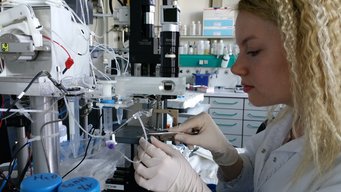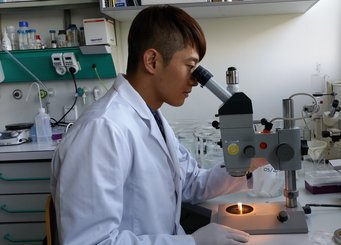Research in Electrochemistry is fostered by two Humboldt Awardees at the Max-Planck-Institut für Eisenforschung
Two postdoctoral scientists, Dr Olga Kasian from Ukraine and Dr Chang Hyuck Choi from Korea, received a fellowship from the Alexander von Humboldt Foundation and chose to continue their work in the field of electrochemistry in the group “Electrocatalysis” of Dr Karl Mayrhofer at the Max-Planck-Institut für Eisenforschung in Düsseldorf (Germany).

Dr Olga Kasian from the Ukrainian State University of Chemical Technology focuses on mixed-oxide anodes for water electrolysis: “With the help of the scanning flow cell, I am going to ascertain the effect of oxygenated species on principles of oxygen evolution reaction and anode active layer degradation.” The scanning flow cell was invented by Mayrhofer's group and helps Kasian in establishing kinetic parameters and mechanisms of oxide anodes active layer dissolution depending on the nature of the base and catalyst oxides. This task is important for the development of water electrolysis technology as a solution for the conversion and storage of excess electricity into hydrogen and oxygen. “I was searching for a research position outside the Ukraine and Dr Mayrhofer invited me to give a talk about my research. I was impressed by the research facilities of the Max Planck Institute and the close connection between basic research and application”, explains Kasian. Collaboration with the University of Virginia (USA) started already. Further networking is planned.

Dr Chang Hyuck Choi from the Korean Advanced Institute of Science and Technology studies the degradation of non-precious metal catalysts. In his previous work Choi focused on the synthesis of catalysts. Now he is going back to basic research by focussing on their degradation in order to understand and thus to further enhance the performance within fuel cells. He works in collaboration with other Max Planck Institutes within the framework of MaxNET Energy – a research cooperation that aims at obtaining a deeper understanding of processes in chemical energy conversion - as well as with the Laboratoire Agrégats, Interfaces et Matériaux pour l’Energie of the Centre National de la Recherche Scientifique (Laboratory of Aggregates, Interfaces and Energy Materials of the National Centre for Scientific Research) in France. “The working atmosphere here in Germany is quite different from Korea. Discussions with professors and supervisors are much easier because of the non-hierarchical structures. The Max Planck Society is well-known in Korea and Germany is famous for its high life quality. These are the main reasons why I applied for a Humboldt fellowship to continue my research in Germany”, explains Choi.
The Alexander von Humboldt Foundation supports excellent researchers from outside Germany with an up to two years scholarship to continue their work in a German scientific institution of their choice. The scholarship counts as an award for the scientist as well as for the host institution.
Author: Yasmin Ahmed Salem, M.A.

